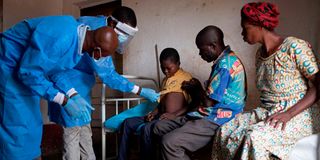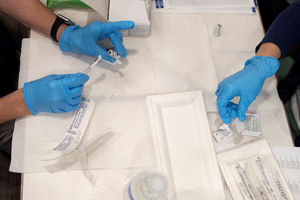Kenya on high alert as Mpox virus is reported in DRC

Marcel Osekasomba, head nurse at the Yalolia health centre, and Theopiste Maloko, a local health official, check the progress of Lisungi Lifafu, 12, who is suffering from monkeypox, while his father Litumbe Lifafu and mother, Lituka Yenga, watch, in Yalolia Democratic Republic of Congo in 2022.
What you need to know:
- The current outbreak in DRC is said to be from a new variant of the virus.
The symptoms of Mpox include a rash, fever and swollen lymph nodes such as sore throat.
Kenya has issued a travel advisory to all counties and border entry points, highlighting the critical importance of early detection of smallpox cases.
Ms Mary Muthoni Muriuki, Principal Secretary (PS) for Public Health and Professional Standards in the Ministry of Health Kenya, stressed that this measure is vital for preventing the introduction of the virus into Kenya.
The advisory provides detailed guidelines and protocols for health officials, border control personnel, and the general public, emphasising the need for heightened awareness and immediate response to identify and address potential smallpox cases.
“We have issued an advisory to all counties and all points of entry at the airports, seaports, and ground crossing points outlining how healthcare workers can detect cases through signs and symptoms. The border points should pay attention to travellers originating from or transiting from affected countries,” Ms Muthoni said.
Developed surveillance
The ministry has also developed surveillance, laboratory, and management guidelines with technical teams to coordinate the response. She said this will mitigate any adverse effects of the outbreak if it is imported into the country.
Further, the ministry has cautioned Kenyans to exercise high levels of hygiene since the virus can also be spread through physical contact with an infected person.
The measure comes in response to recent outbreaks of Mpox in the Democratic Republic of Congo, which is currently recording the biggest outbreak of the viral Mpox disease ever recorded, with tens of thousands of people infected as of June.
According to Africa Centre for Disease Control and Prevention data, about 8,479 cases and 401 deaths from Mpox have been recorded since January 2024. Out of these, 97 per cent of the cases were reported in DRC, now considered a hotspot.
The DRC government declared Mpox an epidemic in December 2022. It has since spread to 22 out of 26 provinces, including Kinshasa.
According to the World Health Organisation numbers, more than 21,000 cases and more than 1,000 deaths were reported in 2022. In 2023, a total of 14,626 cases and 654 deaths were recorded. Most of those infected are children under the age of five.
Mpox is a zoonotic disease caused by the monkeypox virus. It can be transmitted from animals to humans and from human-to-human contact.
Although Mpox outbreaks are commonly reported in DRC, experts are now warning that the new strains could spread to other countries. The virus is grouped into two: the new strain, Clade 1, which is much more severe, and Clade 2, which is less deadly.
The current outbreak in DRC is said to be from a new variant of the virus. It poses a risk of spreading to several African countries.
The Eastern region shares borders with East African countries, including Rwanda, Uganda, Burundi, and Tanzania. Due to human traffic in and out of the borders, Kenya stands at a high risk of exposure to the virus.
Physical contact
So far, South Africa, Mozambique, Cameroon, Nigeria, Sudan, Ghana, Central Africa Republic, Egypt, Benin, Liberia and Morocco have reported cases.
Many African countries lack sufficient capacity to test the virus, which poses a larger threat because they also have limited surveillance and treatment capabilities. This was evident during the spread of Covid-19, when Kenya was caught flat-footed as the virus penetrated through the borders.
In as much as it later put stringent measures in place, the virus had already spread within the community.
Mpox is transmitted through physical contact with an infected person, contact or consuming infected animals. Using materials such as clothing, bedding, towels, and utensils that have not been well cleaned can cause contamination with the virus or even sexual contact.
The symptoms of Mpox include a rash, fever and swollen lymph nodes such as sore throat.
According to WHO, the virus has an incubation period of about 21 days.
The virus morphs into a rash; some become bigger scabs filled with infectious fluids. The lesions often appear on the face, arms and legs but due to the sexual mode of transmission, they have now morphed into the genital areas both male and female.
The Africa Center for Disease Control further urges those exposed to take the necessary health measures and seek healthcare.
“Avoid contact with wild or domestic animals, maintain high levels of hygiene such as washing hands with soap and water, suspected cases should be isolated, those who have tested positive for the virus should wear a surgical mask,” advises the Africa Center for Disease Control.
Healthcare workers have further been advised to dress well while attending to the infected and wash all contaminated surfaces and utensils with hot water, detergent, and disinfectant.
The World Health Organisation also recommends a Mpox vaccine. The virus that causes Mpox is related to the virus that causes smallpox, and the vaccine recommendation for Mpox is JYNNEOS, which is a 2-dose vaccine.
After the first dose, one waits four weeks (28 days) for the second dose, and after two weeks of taking the second dose, one is certain of maximum protection.
However, the WHO has stated that the lack of sufficient vaccines in African countries makes it difficult to control the virus, which is currently wreaking havoc in the DRC.




